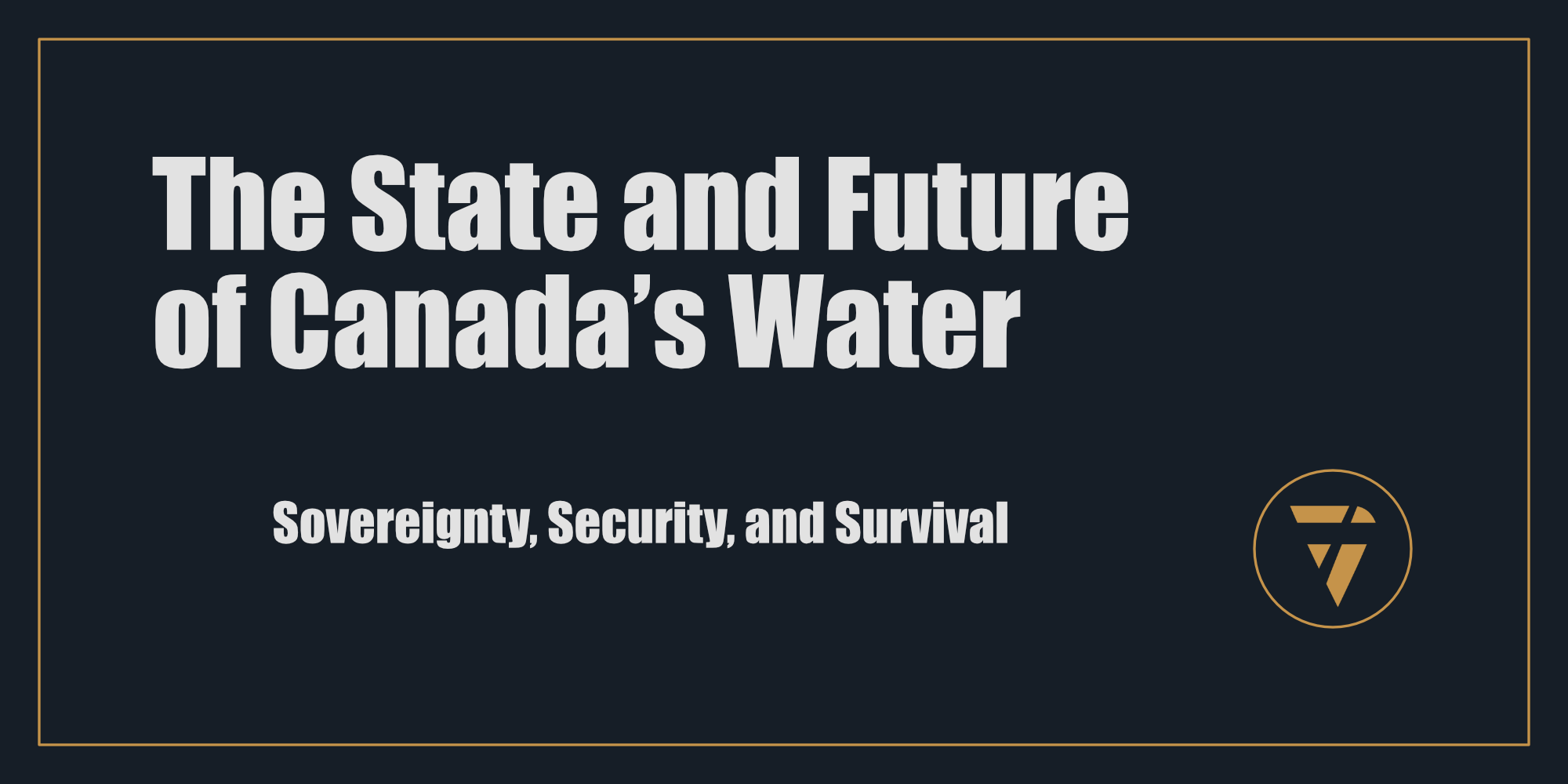The State and Future of Canada’s Water

Sovereignty, Security, and Survival
Water is the most critical resource on Earth—more valuable than oil, gas, or any mineral. Canada, with its vast freshwater reserves, holds 20% of the world’s freshwater supply and 7% of the world’s renewable freshwater. This positions Canada as a water superpower, yet this status comes with significant geopolitical risks, especially from our neighbour to the south.
With increasing pressure from the United States—whether through overt demands, underhanded policy shifts, or outright violations of existing treaties—Canada must recognize that water is not just a natural resource. It's national security, economic leverage, and a defining asset of sovereignty.
The growing U.S. interest in Canada’s water is not new, but under Trump/Musk, the rhetoric is explicitly aggressive. As climate change intensifies and water scarcity grips key U.S. states, the demand will only increase. Canada’s response must be firm, strategic, and non-negotiable.
The Unfair Water Treaties: A One-Sided Flow
Canada and the U.S. have multiple water-sharing agreements, most of which heavily favour the U.S. Among them:
1. The Boundary Waters Treaty (1909)
This treaty, which created the International Joint Commission (IJC), was meant to ensure equitable water sharing. In practice, however, decisions often lean toward U.S. interests, with Canada conceding rights in cases of diversion and usage conflicts.
2. The Columbia River Treaty (1964)
One of the most controversial agreements, this treaty allows the U.S. to control and manage water flows from British Columbia into the Columbia River system, benefiting U.S. agriculture, industry, and hydroelectric production. Canada is compensated, but far below the real economic value of the resource.
3. The Great Lakes Water Agreements
These agreements prevent large-scale diversions of water but have loopholes that U.S. states have exploited to drain more than their fair share. Nestlé and other corporations have further exacerbated the imbalance by extracting water at minimal cost for resale.
4. The St. Mary and Milk River Treaty
This 1909 agreement is particularly lopsided, with the U.S. receiving significantly more water from Alberta and Saskatchewan than Canada does in return.
5. NAFTA and USMCA Water Provisions
Under NAFTA (and later USMCA), Canada successfully resisted classifying water as a “good” subject to trade rules. However, corporate lobbying and U.S. policy shifts continually challenge this position, attempting to create precedents for large-scale water sales.
If someone is curious... imagine where every drop of water in a Four Seasons comes from. Hint: it ain't from the Saudi owners. Bill and friends own more of our water than most people would be comfortable with, if they knew. We don't own what we think we own in Canada.
A History of U.S. Treaty Violations
The U.S. has a consistent track record of bending or outright violating water treaties when it suits their needs. Some recent examples:
- Great Lakes Compact Loopholes: Several U.S. states have found ways around withdrawal limits, expanding their access to Great Lakes water without Canadian approval.
- Columbia River Treaty Manipulation: The U.S. has reaped billions in hydroelectric profits while underpaying Canada for flood control and power benefits.
- Recent Unauthorized Diversions: In the last month alone, reports surfaced of unauthorized diversions affecting Prairie provinces, a clear violation of existing agreements.
Canada must respond decisively. Diplomatic protests and appeals to the IJC are no longer enough. If the U.S. continues its pattern of aggression, Canada must be prepared to cut off access.
Turning Off the Tap: Canada’s Nuclear Option
If the U.S. escalates its water demands or attempts to force Canada into an export agreement, Canada holds powerful countermeasures:
1. Cut the Flow of Water
A unilateral review of water-sharing treaties could justify restricting or reducing U.S. access. If the U.S. wants more water, they can renegotiate under fair terms—or get nothing.
2. Turn Off the Energy
The U.S. depends heavily on Canadian oil, gas, and electricity. If the U.S. oversteps, Canada should be prepared to throttle energy exports as leverage.
3. Assert Sovereign Control Over Resources
Canada must make it clear that water is not for sale. Constitutional protections should be strengthened to ensure that no federal or provincial government can override national security interests in favour of corporate profits.
4. Build Domestic Infrastructure First
Rather than catering to U.S. demands, Canada should prioritize water infrastructure that ensures domestic supply, strengthens environmental protection, and guarantees long-term sustainability.
5. Strengthen Northern and Indigenous Water Rights
Indigenous nations have been vocal in protecting their water rights. Canada should work with Indigenous leadership to build legal and environmental safeguards that prevent water theft and exploitation.
Canada. Stand the fuck up for what we are, and what we have. Stop selling it off for scraps.
Water as a Canadian Weapon
Water is power—economically, strategically, and geopolitically. If Canada allows itself to be bullied into surrendering its most valuable resource, it will set a precedent that will be impossible to reverse. Canada must:
- Refuse all bulk water exports under any circumstances.
- Review and renegotiate unfair treaties to ensure Canada benefits fully from its resources.
- Increase federal and provincial legal protections against water privatization and foreign exploitation.
- Expand research into water security to safeguard Canada’s long-term interests.
- Use energy and trade as leverage against U.S. overreach.
The U.S. will always need more water than it has. Canada must decide now whether to stand firm or be drained dry.
Water is not a commodity. It's Canada’s future.
This is what I’m working on. Tell me what you think, I enjoy the conversation! Subscribe and follow the work in real time.
Thanks!
B

Canada holds 20% of the world’s freshwater. The U.S. wants it. Treaties are unfair, violations are routine, and the pressure is mounting.
Canada must refuse bulk exports, renegotiate bad deals, and be ready to turn off the tap.
No more concessions. No more theft.
Water is power.
PS -






